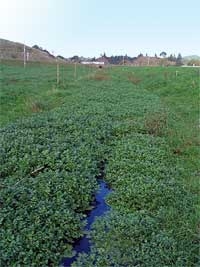Watercress: one step to cleaner waterways?

Nitrogen and phosporus runoff from farms is having a significant effect on the viability of lakes in the Rotorua district but new work by NIWA scientists may provide a solution to help the clean-up.
Watercress, which grows naturally in New Zealand, is being trialled to see if it removes nutrients from waterways. The plant is regarded as a ‘luxury’ feeder because it can absorb more nutrients than it needs to survive.
In our trial, water from a local Rotorua stream is fed through troughs planted with watercress at two flow rates. Tests conducted over summer and autumn show that at a lowflow rate the watercress was absorbing as much as 40% of the nitrate and phosphate from the water. At a higher flow rate nutrient levels were reduced by up to 15%.
Initial results from trials conducted during winter show a poorer level of nutrient uptake but the research will continue until next autumn. At that stage results will be assessed to determine whether a larger scale operation is viable. It is also possible that the watercress used could be harvested for stock feed or human consumption; further work is needed in this area.
The study has been commissioned by MAF, through its Sustainable Farming Fund, and is managed by Rotorua Lakes and Land Trust, a group of farmers and land owners including representatives of Rotorua/Taupo Federated Farmers and Te Arawa Federation of Māori Authorities. It is being run with the cooperation of Ngati Whakaue Tribal Lands Trust.
